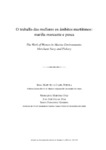Mostrar o rexistro simple do ítem
O traballo das mulleres en ámbitos marítimos: mariña mercante e pesca
| dc.contributor.author | Campa Portela, Rosa Mary de la | es_ES |
| dc.contributor.author | Martínez-Díaz, Margarita | es_ES |
| dc.contributor.author | Galán-Díaz, Juan José | es_ES |
| dc.contributor.author | Fernández Garrido, Simón | es_ES |
| dc.date.accessioned | 2015-11-09T09:12:04Z | |
| dc.date.available | 2015-11-09T09:12:04Z | |
| dc.date.issued | 2013 | es_ES |
| dc.identifier.citation | Anuario da Facultade de Ciencias do Traballo da Universidade da Coruña, 2013,4:149-174.ISSN: 2173-9811 | es_ES |
| dc.identifier.issn | 2173-9811 | es_ES |
| dc.identifier.uri | http://hdl.handle.net/2183/15506 | |
| dc.description.abstract | [Resumo] Aínda que a igualdade de xénero se establece como unha prioridade no marco lexislativo de todos os países que conforman a Unión Europea, a prevalencia dos estereotipos sociais que asignan un determinado rol a homes e mulleres dificulta de xeito substancial a súa consecución. A maioría das mulleres que pertencen ao sector pesqueiro realizan o seu labor en terra –marisqueo, acuicultura ou transformación– e están infrarrepresentadas na pesca extractiva con embarcación (0,5%). No caso da mariña mercante obsérvase unha escasa representación: aproximadamente un 7% do total das mulleres mariñas, fronte a un 42% do total dos homes mariños, un desfase que parece provir do rol tradicional que se lle asigna á muller na familia. Neste traballo avalíase a situación das mulleres que se dedican profesionalmente ao sector marítimo, tanto mercante como pesqueiro. Ademais, analízase a representación feminina e as dificultades de acceso e ascenso na carreira profesional das mulleres no caso da mariña mercante. | es_ES |
| dc.description.abstract | [Abstract] Although gender equality is established as a priority in the legislative framework of all the countries that form the European Union, the prevalence of social stereotypes that assign a certain role to men and women impedes their attainment in a substantial way. Most of the women who belong to the fishing sector realize their labour on land - shell fishing, fish farming or transformation -, and are underrepresented in extractive fishing with craft (0.5%). In the case of the Merchant Navy a scanty representation is observed: approximately 7% of the total of marine women, as opposed to 42% of the total of marine men. This gap seems to come from the traditional role that is assigned to women in the family. In the present work, the situation of the women who devote themselves professionally to the maritime sector, both merchant and fishing, is evaluated. In addition, their representation and difficulties of access and promotion in the professional career in the case of the Merchant Navy is analysed. | es_ES |
| dc.language.iso | glg | es_ES |
| dc.publisher | Universidade da Coruña | es_ES |
| dc.subject | Xénero | es_ES |
| dc.subject | Pesca | es_ES |
| dc.subject | Mariña mercante | es_ES |
| dc.subject | Protección social | es_ES |
| dc.subject | Gender | es_ES |
| dc.subject | Fishing | es_ES |
| dc.subject | Merchant Navy | es_ES |
| dc.subject | Social protection | es_ES |
| dc.title | O traballo das mulleres en ámbitos marítimos: mariña mercante e pesca | es_ES |
| dc.title.alternative | The Work of Women in Marine Environments: Merchant Navy and Fishery | es_ES |
| dc.type | info:eu-repo/semantics/article | es_ES |
| dc.rights.access | info:eu-repo/semantics/openAccess | es_ES |






